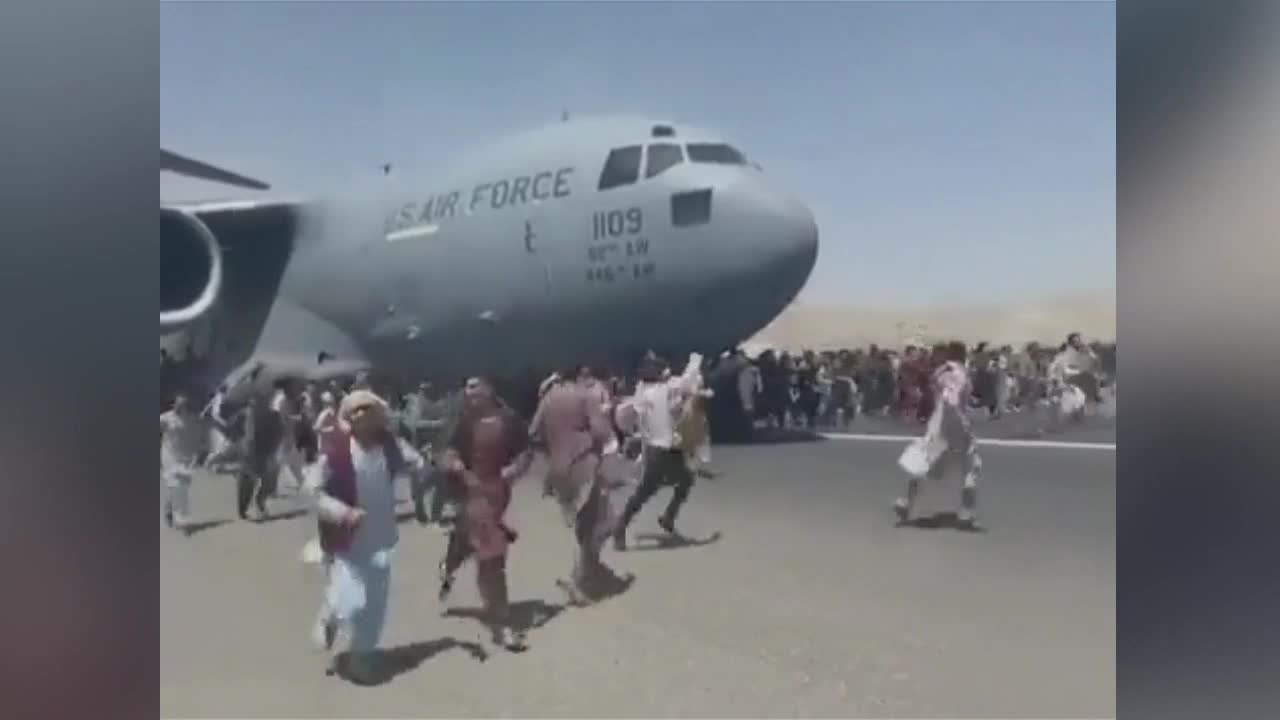One year after Afghanistan withdrawal, man living in Richfield voices concern about family in Taliban territory
[anvplayer video=”5132191″ station=”998122″]
The scene was chaotic and frantic at the Kabul Airport in Afghanistan.
Men, women and children were crowded together, surrounded by barbed wire and walls.
Desperate to find a way out of the country, with the U.S. military withdrawing its forces.
“The day the U.S. left, the country was just like… everybody felt despair,” recalls Qais Zazai, now a U.S. citizen living in Richfield. “The airport was a big rush. The military airport, everybody was trying to get out of the country. There was like so many kids that just die. Under the feet, you know, five years old, three years old, four years old.”
Zazai, 31, now lives in the metro with his wife and their one-year old son, Muqtadir.

Afghans try to board a moving U.S. plane during the troop withdrawal in August 2021. (FILE)
His brother, who worked in food supply with the U.S. military — and their mother are still in Kabul.
He says August of 2021 was not an easy time.
“A translator or advisor, they were all suffering and scared from the situations,” Zazai recalls. “Because you should not go out of the house because you never know what’s going to happen, because the government was gone, and it was a Taliban government.”
He says he worked for seven years as U.S. military translator, before coming to the states in 2014, seeking a better life.
Zazai says he returned annually to visit his family, and in 2018 got married, his wife remaining in Afghanistan.
In 2021, he arrived just one month before the U.S. withdrawal and the Taliban takeover — planning to be in Kabul to take care of his wife financially, and see the birth of his son.
Zazai says he and his young family were finally able to come to the U.S. in May of this year.
But before they left, he says it was evident life under Taliban rule had changed.
Zazai says he personally didn’t see Taliban soldiers going house to house, searching for people who had worked with the U.S. military.
Still, he says, he tried to stay off the street.
“I was in my house for almost seven months and haven’t seen anybody knock on my door, because everybody in my neighborhood knows about me, that I used to work for this country and have a passport,” Zazai explains. “I haven’t seen (the Taliban) looking for me or my brother, and take me out of the house, you know?”
A year later — Taliban troops are patrolling the streets, many of them using U.S. equipment left behind.
ABC News reported on Tuesday that women, marching for education and other rights were being beaten in the streets, or that soldiers would shoot guns over their heads.
“If we look at Afghanistan today, in terms of humanitarian situation, it’s been disastrous, it’s been a catastrophe,” Kathleen Collins, an associate professor of political science at the University of Minnesota and the author of a soon-to-be-published book, “Politicizing Islam in Central Asia,” said. “The 39-million people of Afghanistan are facing starvation and malnutrition. The UN estimates about 97% of the country doesn’t have enough money for basic needs, which means food.”
She says the Taliban has also reneged on its initial statements that it would reopen girls’ secondary schools and allow women to go to universities.
“A whole generation of women who were brought up with expectation that they would be able to go to school like everybody else in the world are still waiting at home a year later, attempting to complete their education,” Collins notes.
She also says the U.S. withdrawal has created a vacuum for terrorism in the country.
And — Collins says, U.S. intelligence agencies lost a lot of sources on the ground — key sources of hard information.
That, she says is gone — with people no longer trusting the U.S. government after being left behind.
“There are periodic judicial killings perpetrated by the Taliban against those who probably worked for the U.S. government or U.S. military bases,” she explains. “When the Taliban came in and opened up the prisons, Isis-K, Al Qaeda, all these militants returned to the streets, so we created for ourselves going forward, another terrorist problem.”
Meanwhile, at some point, Zazai is hoping to bring his mother, brother and four other family members to the U.S.
But he says it won’t be easy.
Zazai says the Afghanistan government is charging people $1,000 apiece for passports, and anyone trying to leave the country faces huge bureaucratic delays.
Right now, he’s working a security job in the metro.
For now, he has no plans to return to his homeland.
“No, I don’t think so, because it’s not good there, “ Zazai says quietly. “It’s not time to go now.”